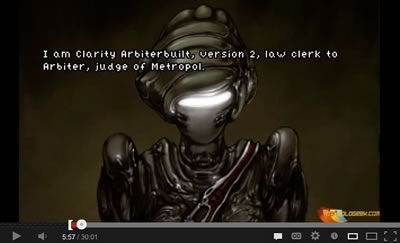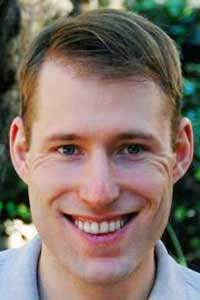If you really want to improve your legal writing, says Mark Yohalem ’05, try writing a video game. A prosecutor at the U.S. attorney’s office in Los Angeles with a Supreme Court clerkship under his belt, Yohalem has written more than 20 short stories and seven computer games in his free time. He credits the latter with keeping his writing fresh and reminding him that there are multiple ways to tell a good story.
Then again, a lawyer’s obsessive attention to detail also affects the way Yohalem approaches creative writing, including his latest accomplishment, “Primordia,” a game that takes place in a desolate landscape ruled by robots that inherited the world after humans became extinct.
“It’s astonishing to me that there will be games with phenomenal graphics and orchestral scores and there will just be grammar errors,” Yohalem said. “I deliberated about every single word. A lawyer is more likely to have that kind of neurotic attitude about things than your ordinary game designer.”

Legal concepts also shaped “Primordia.” Complete with detailed, two-dimensional graphics, point-and-click adventuring and a series of puzzles, some shaped by LSAT logic games, “Primordia” features an in rem legal dispute, a robot law clerk named Clarity, and a debate between legal positivism and empathetic judging.
Yohalem, who paid his way through law school in part by writing stories for computer games, credits Harvard Law School with inspiring him to work on a video game with a serious storyline, rather than the more typical fare focused on blowing up bad guys.
In one instance, he recalled, Professor Lloyd L. Weinreb ’62 chewed him out for working on a video game that had “no redeeming value to it.” Yohalem admitted he was right but countered that someone was going to write it, so it might as well be him.
“He said that’s a complete cop-out,” Yohalem recalled. “‘Someone might write it,’ he said to me, ‘but you have a set of skills and you should be trying to use those skills for something more rewarding.’”
There is another aspect of the game that law school grads will find familiar: There’s no perfect ending. In the “best” storyline, the protagonist abandons a city in the hands of a corrupt artificial intelligence and sets out with others to create a more equitable society.
“There’s a mindset people have that games are the ultimate power fantasy, and through the power of one person, usually through physical force, you can change the world from a bad place to a good place,” Yohalem said. But, much like lawyering, “the game is more about an incremental process, not something that can be done in one fell swoop.”
